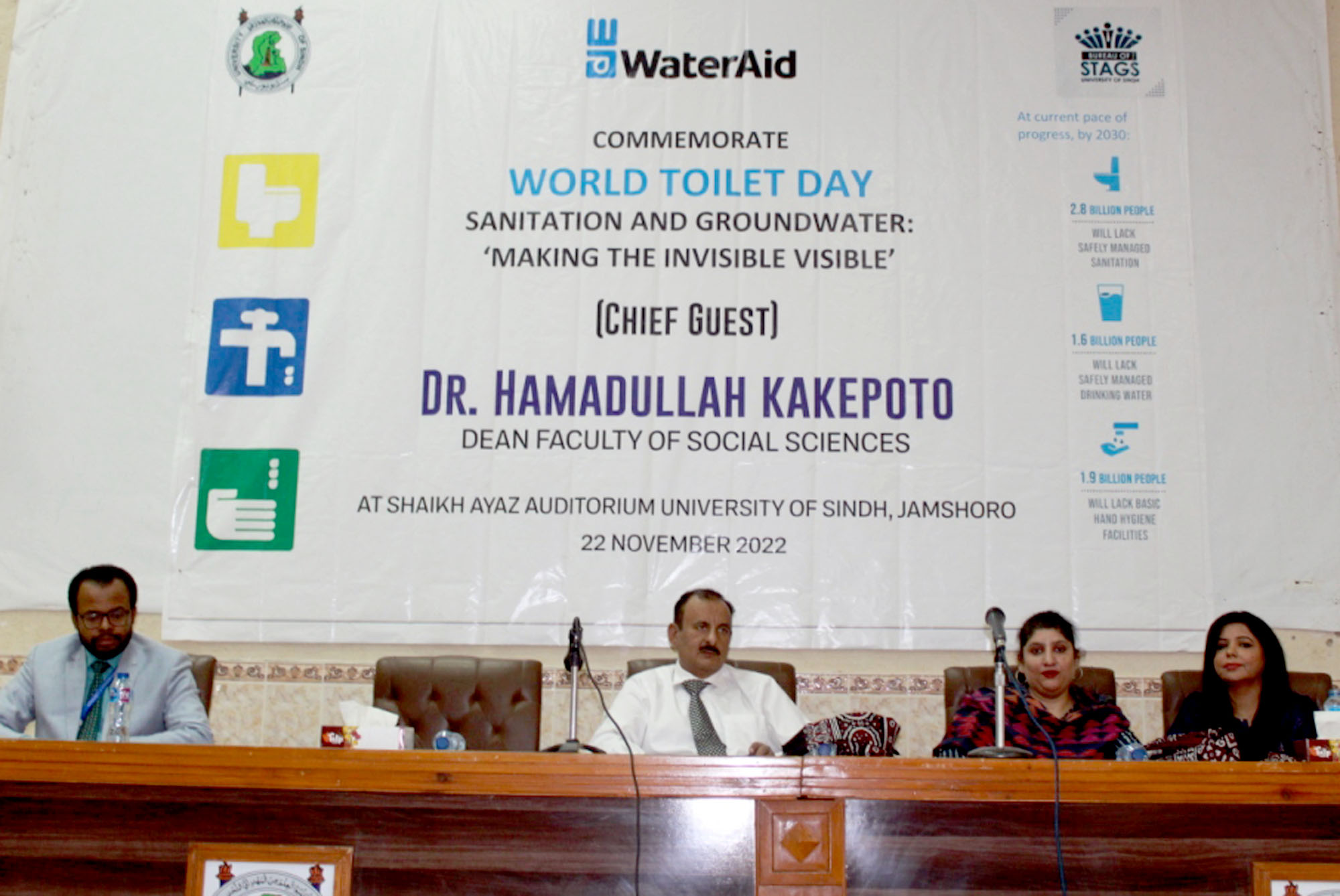
Call for constructing toilets at public places to halt pollution of underground water, environment, human health
Speakers have demanded that the provincial government should construct toilets at public places and make proper arrangements for cleaning them, besides making latrines part of the policy as the lavatories are directly related to human health, environment, river and underground water.
They said that Pakistan was actually the third largest country after India and Indonesia, where people were forced to defecate in the open air, while the problem of sanitation persisted not only in the country but also at a global level.
This they said while addressing a seminar organized by the Sindh University’s Bureau of STAGS in collaboration with Water Aid on the occasion of World Toilet Day at Sheikh Ayaz Auditorium of Arts Faculty Building. Dean Faculty of Social Sciences Professor Dr. Hamadullah Kakepoto presided over the seminar.
The speakers said that as many as 3.6 billion people were living in very poor and unsanitary conditions, while there was a toilet crisis and a pitiable sanitation system across the country including Sindh.
In his presidential address Dr. Hamadullah Kakepoto said that due to low quality toilets or open defecation by people was extremely harmful to human health and the environment, because it polluted the environment and spread the smell far and wide.
He said that it was necessary to follow the proper principles of cleanliness in washrooms, for which every member of the society and the government had to play a pivotal role.
Environmentalist Dr. Amanullah Mahar said that proper human health plans were essential to protect underground water, adding that where there were no good quality toilets, human waste polluted rivers, lakes, soil and underground water to a great extent which he said was hazardous.
“It is said precaution is better than cure, therefore, the government should prioritize the mental and physical health of the nation, but unluckily it can’t be seen anywhere in Pakistan”, he lamented.
Director of the SU’s Bureau of STAGS Professor Dr. Ghazala Panhwar said that the countries that prioritized the mental and physical health of their nation had made their people cleanliness lovers.
She said that the governments that took concrete steps to provide toilet facilities, after understanding the secret of protecting the underground water, environment, rivers, lakes and soil, were maintaining high standards of cleanliness and hygiene.
She said that it was the need of the hour to effectively control the environment through implementing strict regulations, after constructing clean toilets at all major places including parks and gardens.
She demanded that the Sindh government should take steps to ensure the provision of public latrines everywhere and that their cleanliness should also be managed, adding that the provincial government should make it a part of its policy.
Provincial Coordinator of Water Aid Raheema Panhwar said that many countries, especially the countries in Asia and Africa, had major problems related to toilets and sanitation, because proper attention had not been paid to the issue so far, which always caused the spread of epidemic and chronic diseases.
She said that whenever a disease took place in these countries, including Pakistan, it spread at the larger scale as a result of which it infected many people in a short span of time.
She said the provincial and federal governments had to develop a mechanism to ensure the establishment of toilets and their sanitation.
Dr. Naveed Ahmed of Mehran Engineering University said that pan stains and garbage spoke well about the indifference of toilet users across the country, including Sindh, adding that pan spits in the latrines always unearthed as to how civilized the people of Pakistan were as a nation.
He demanded that the provincial government should construct toilets at various public places and parks, besides; it should launch a campaign to create awareness among the people about how to use toilets and how to take care of sanitation.
Dr. Ahmed Ali Brohi, Dr. Ishrat Afshan Abbasi, Professor Muhammad Siddique Soomro, Dr. Rashid Khuhro, Professor Farhat Jokhio, Fauzia Siddiqui and many others participated in the seminar.